All the photos are courtesy of Mamadou Sissoku.
With more than 60 million persons currently displaced worldwide and European particularly receiving a huge influx of asylum seekers from across the Mediterranean, Italy has implemented various projects to host and support asylum seekers and refugees.
In some cases they involve entire families, and the experience becomes a life-changing experience both for the host families and the people hosted.
"Our lifestyle has been definitely reshaped. When you get in contact with people who really do have nothing, everyday life's priorities need to be reset."
"Our lifestyle has been definitely reshaped," Claudia Tortello, an Italian from the Biella province tells SBS.
Tortello volunteered to take in Mamadou Sissoku, a refugee from Mali, after meeting him at a refugee centre, where her daughter Lana was teaching Italian. She explains that the experience has been eye-opening.
"We did not live in the lap of luxury," she explains. "But when you get in contact with people who really do have nothing, a reshape is needed and everyday life's priorities need to be reset."
Sissoku's story is similar to the story of many young Africans: born in a very poor family of farmers, he left his country aged 17 find better opportunities in Libya.
"The war broke out and in a moment I lost everything."
"I emigrated to Libya where I worked for 4 years in order to improve my skills as tiler and to save some money to send back to my family," Sissoku tells SBS. He had first learnt the trade in Bamako, Mali's capital city.
"Then in 2011, I was ready to go back home. I had also bought some tools to work as tiler in my village, but the war broke out and in a moment I lost everything."
As the country descended into chaos, Sissoku suddenly found himself unable to renew his documents to return to Mali.
"They immediately blocked the borders and I couldn't go home anymore," he says. "That's why I stayed in Libya."
"Then one day, when I was working in a construction site, Gaddafi's men came, they gathered us together and told us that if we helped them to make war, after the war they will help all of us."
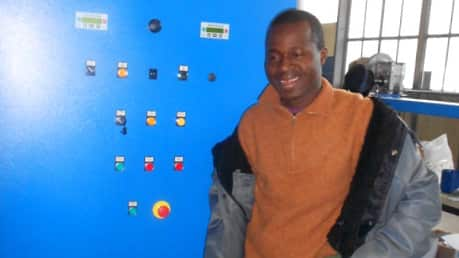
Sissoku refused to join Gaddafi’s men.
"None of us wanted to be involved in the war," he said. "So we were imprisoned."
"After that, one day they came during the night and all of us had to go on a truck that took us to the port."
"Then they started beating us, some were also stabbed, and then they threw all of us on a boat and they said: if you don't want to make war just go away, go away and die in the sea, you're useless for us.
"They ripped up all our documents. They took away clothes, shoes, belt, we had nothing ... They put all of us on a boat. We were about 700. They put one above the other and we were sent away."
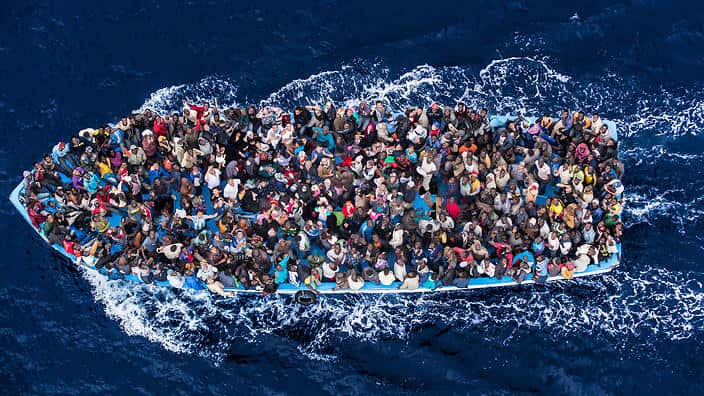
Sissoku shared the vessel with hundreds of other people, terrified and without knowing where he was going. Hailing from land-locked Mali, the entirely new experience of sea-travel added an extra element of fear for Sissoku.
"I thought I was dying because I was on something that I had never seen.... the sea."
"Two days with no food and no water," he says. "There were many women on the boat, pregnant women and many children."
Eventually they approached the Italian coast outside Lampedusa.
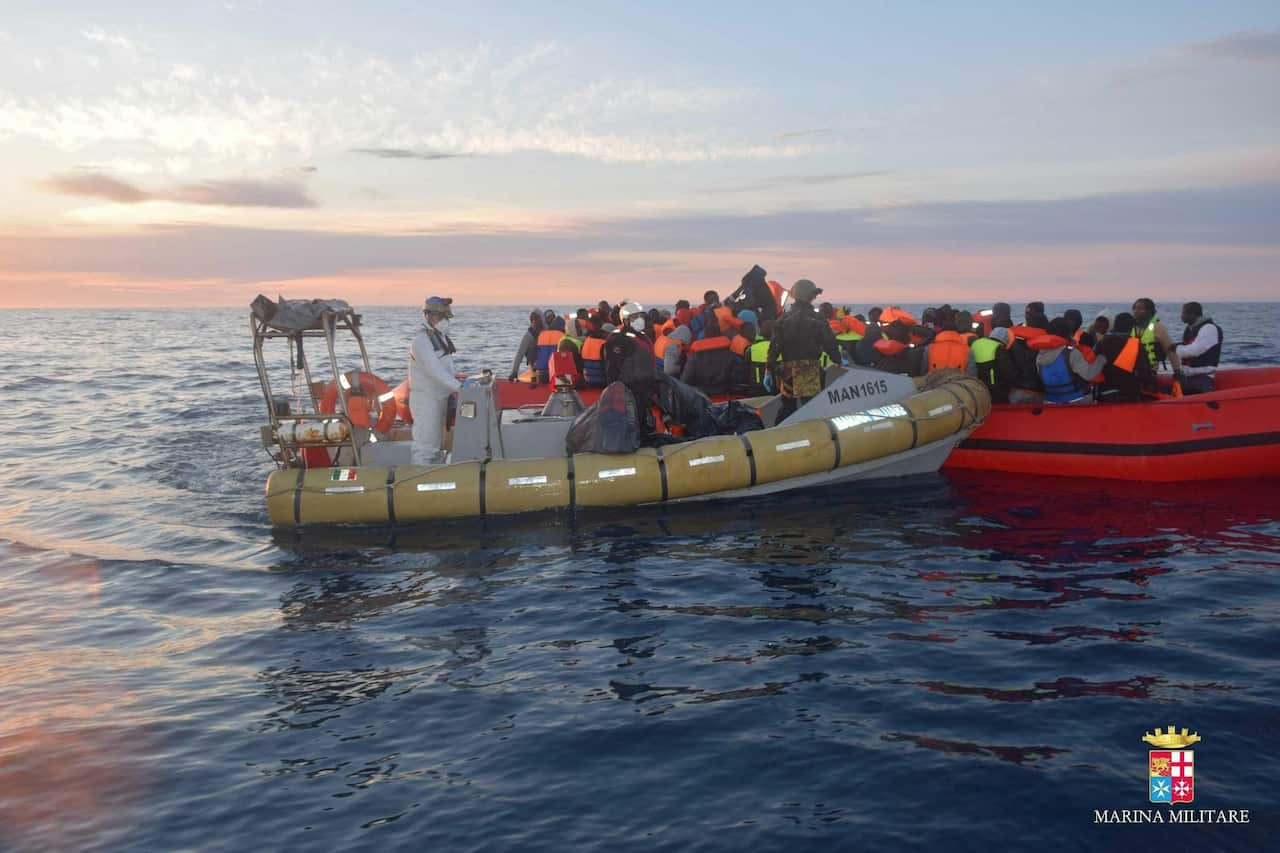
"When we approached the coast, the boat stopped because something was wrong,” Sissoku says. “It wasn't going neither forward nor back anymore."
"Someone said that the boat was broken.
"We all thought we were about to die and then, thank God - and thank the Italians who have seen the boat intervened to help."
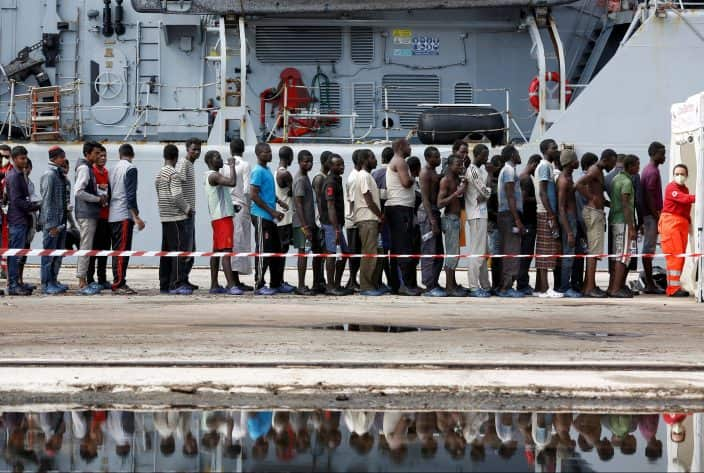
"Even though we couldn't understand a word of the language, we knew they were helping us"
Sissoku says that the Italians were their lifeline.
“Even though we couldn't understand a word of the language, we knew they were helping us," he says.
“They gave us food, they gave us some clothes - all the things you need. It really was a nice welcome.”
"Today I have four parents: two white and two black"
Soon after, Sissoku found himself at the refugee centre – and it there that he speaks fondly of meeting Lana and then Claudia – who were to become his new "Italian family."
"I've met my sister at the refugee centre," he says, referring to Lana, who he would come to know as a sister. "She was teaching Italian there. I arrived here and I was illiterate, I didn't even know how to write my name."
“My Italian sister is the daughter of my Italian mother... because today I have four parents: two white and two black."
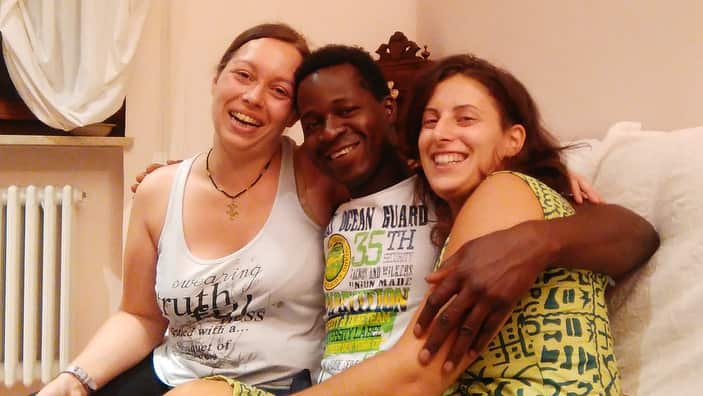
Explaining how they came to live together, Sissoku says, "One day she invited me to her house to make the Christmas tree - and I did not even know what a Christmas tree was - not putting lights on a plant!”
"I went to her house to help and everything started that way.
"Then they offered me a small job, which at the beginning was very difficult for someone who is not educated. But my dad is very clever and he taught me everything with a lot of patience."
"It was impossible even to think of sending him again to the refugee centre"
"I didn't know them well but I knew that they were good people, because who brings home a black boy, illiterate, from a refugee centre?”
Tortello explains that the Sissoku’s integration into the family was a natural development. "When Mamadou completed the job he was doing for us, he had already become a member of our family and for us it was impossible even to think of sending him again to the refugee centre."
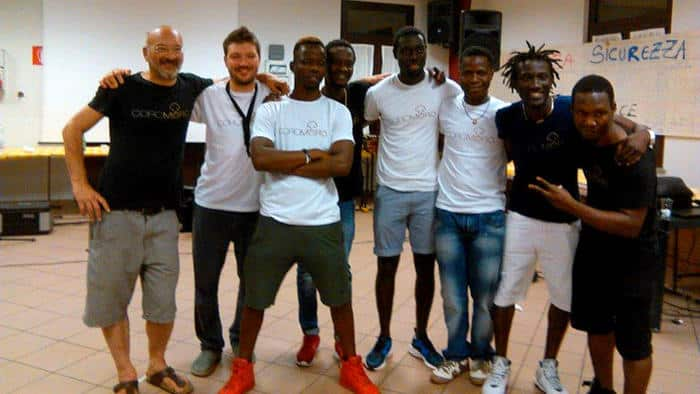
Sissoku was overwhelmed by their generosity – and soon, they were basically family.
"They welcomed me here, they have done everything for me," he says. "My mum cooks everything I like."
"They immediately started teaching me how to live here in Italy, what the rules are ... They treated me always as if I really was their son.
"They treated me always as if I really was their son."
"I really don't know how to thank them."
If Mamadou feels he has found a new family with Claudia, she too says she has found a son in Mamadou.
"Today Mamadou is like a son for us,” she says. “The bond between him and my children became very strong. They are like brothers."
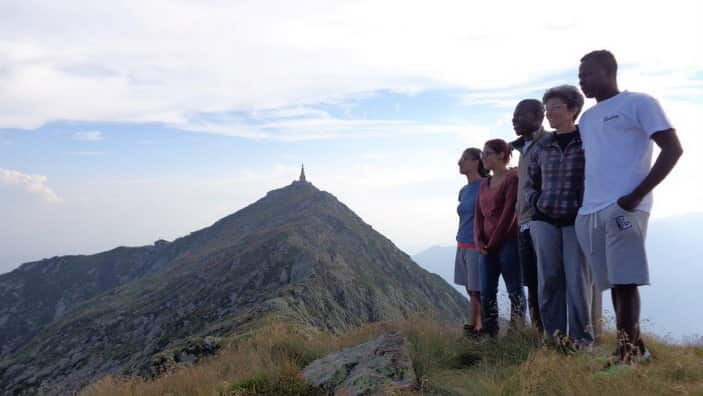
Tortello says that it was as much an educational experience for the family as it was for the illiterate Mamadou to not only learn to speak Italian, but to read and write too.
"For us it has been a continuous learning," Tortello says. "Mamadou learned from our culture but it has been a constant give and take, in the sense that we also learn constantly from him, he gives us life lessons every day."
After the family’s experience hosting Sissoku, Tortello says there are some important lessons that the rest of Europe could learn as it struggles to accept and accommodate the current migrant crisis.
"Migrations have always existed. We Italians are everywhere. We hope that our children will never experience what they have experienced"
"The important thing is not being afraid of differences, because most of the time you're afraid of the unknown," she says.
"But this shouldn't happen. They're just people. People as we are. For example, he is Muslim and we are Christians, however, there has never been any issue."
"We must not think negatively about these people. Migrations have always existed. This is a fact that allowed the evolution in our society. We Italians are everywhere. Many of our children emigrate these days to find work but for these guys is different, they come from desperate situations. We hope that our children will never experience what they have experienced".
Listen to the full interview with Claudia Tortello (in Italian) below:
Sissoku says the experience has had a profound effect on him.
“After nine years, last year I went back to Mali,” he says.
“Nothing changed in my village, but I did. Especially because now I can read and write. My parents in Mali now are very proud of me, especially because of the things I've learned from my Italian family."
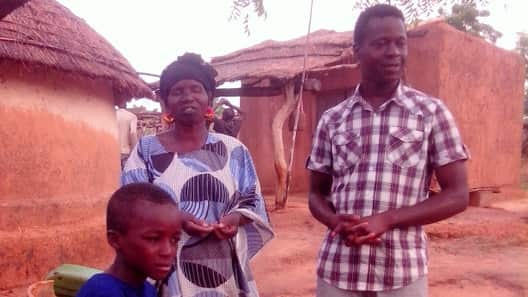
“I'm sure one day I'll go back to my village because I want to share with my people the things that I've learned here in Italy.”
“I want young people to stay in Mali otherwise who will make it a better place?”
Listen to the full interview with Mamadou Sissoku (in Italian) below:
To learn more about the project "ProTetto. Rifugiato a casa mia" you can listen SBS Italian's interview (in Italian) with Daniele Albanese, from Caritas.
